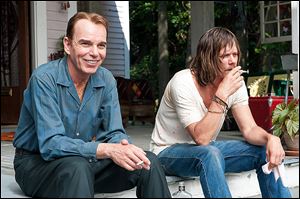
MOVIES
Billy Bob still stands up for Southern voices in the cinema
8/26/2013
Billy Bob Thornton, left, and Kevin Bacon in a scene from 'Jayne Mansfield's Car.'
The rural South hasn’t produced many filmmaking voices. But one of them is Billy Bob Thornton. And that’s important, because there are things a guy who grew up in the South knows, experienced and appreciates that no New York film school alumnus or third-generation scion of Hollywood could.
“When you grow up in a small town, there’s not a lot of variety in what you do for entertainment,” the Oscar-winning Arkansan drawls. “The sense of wonder is greater when you grow up in a small, rural town. When you’re raised in the middle of nowhere, you wonder ‘What’s out there?’”
And you’d be hard pressed to find a city kid, from either coast, who laid eyes on the vehicle where 1950s and ‘60s starlet Jayne Mansfield met her grisly end in a pre-airbags/pre-seatbelts era. It toured Southern county fairs and race tracks in the late ’60s and early ’70s. And it became the title of Thornton’s new film, Jayne Mansfield’s Car.
“Oh, I saw it. Twice. My dad, he took me. And Tom Epperson (Thorton’s frequent writing collaborator and lifelong friend) took me once. We saw it in the early ’70s, 71-72.”
Jayne Mansfield’s Car is a wildly eccentric slice of late ’60s Southern Gothic about a wealthy Alabama family headed by a World War I vet (Robert Duvall, “the character’s loosely based on my dad”) and featuring two troubled war-vet sons (Kevin Bacon and Thornton), a resentful son who never served (Robert Patrick), and a promiscuous daughter (Katherine LaNasa). The funeral of the matriarch, who moved away and remarried years before, brings English relatives to town for a good old-fashioned, strained, and even kinky family get together.
The London Evening Standard’s critic, Derek Malcolm, called the film a “strange Alabama version of Chekhov,” which fits. That title and the car itself are full of “celebrity and magic,” Thornton says, “because Southerners are closer to death. ... Death is in our folklore. Sometimes, the most horrible, gory situation would be funny to us. That’s Southern, I think.”
He takes as his inspiration the writings of Nobel Prize winner William Faulkner, and the films he’s written or co-written (with Epperson) — One False Move, Daddy and Them, A Family Thing, and The Gift — are as distinctly Southern as anything produced by the author of As I Lay Dying. But even though Thornton wrote the movie and the role that made him famous — and won an Oscar for writing Sling Blade — “I am first and foremost an actor.”
To that end, the 58-year-old Thornton has films lined up well into the future, with the first, Parkland (in which he plays a Secret Service agent who witnesses the JFK assassination) due out in September. But in the 20 odd years that he’s been famous, Thornton has made headlines for all sorts of things that have nothing to do with the work.
He’s had a band, off and on, since his teens. He’s been married five times, to a Playboy model and a trio of actresses, including Angelina Jolie. (He was engaged to Laura Dern for years.) He has obsessive-compulsive disorder, that manifests itself in well-publicized phobias about antique furniture and certain types of silverware. When he’s playing all these eccentrics on the screen, from A Simple Plan to Bad Santa, or School for Scoundrels, there’s a credibility there based on what we know about him.
“My eccentricity is played up a bit more than the reality reflects,” said Thornton, laughing, as if he didn’t bring on that reputation himself. “If you hung out with me a couple of months, you’d be pretty bored. When you’re doing an interview, there’s usually an angle. They’re looking for an angle, a soundbite or on a talk show, a laugh. What’s the craziest thing about me? I can mention something in an offhand way — a phobia or whatever. It becomes a huge deal. I’m famous for my phobias, and it’s not that they don’t exist. They exist in a lot of people, and it just gets exaggerated with me. I’m not that out-there.”
He swore he’d never direct another movie after he had to cut an hour out of his film of Cormac McCarthy’s All the Pretty Horses. But here Thornton is, over a decade later, back behind the camera.
“Don’t expect to find me there again any time soon,” Thornton says. “The acting takes up most of my time. I only want to direct if it’s kind of ‘my thing,’ a movie that’s Southern, that feels Southern, and that sounds Southern that I’ve had a hand in writing.”